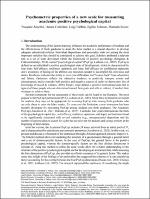Chapter Psychometric properties of a new scale for measuring academic positive psychological capital
Author(s)
Anselmi, Pasquale
Colledani, Daiana
Fabbris, Luigi
Robusto, Egidio
Scioni, Manuela
Language
EnglishAbstract
Positive psychological capital (PsyCap) is the name given to a set of psychological dimensions (hope, resilience, self-efficacy, and optimism) that may support students in their effort to achieve better academic results and even improve the employability of graduates. These dimensions could help students to achieve better academic results and impact fresh graduates’ ability to stand the labour market in times of crisis. A scale, called Academic PsyCap, was specifically developed to evaluate the four PsyCap dimensions among students and fresh graduates. To deeply investigate the structural validity of the scale, three alternative models (one-factor model, correlated four-factor model, bifactor model) were run on the responses provided by about 1,600 fresh graduates at the University of Padua. The results indicated that the bifactor model fit the data better than the other two models. In this model, all items significantly loaded on both their own domain specific factor and on the general factor. The values of Percentage of Uncontaminated Correlations (PUC), Explained Common Variance (ECV), and Hierarchical Omega suggested that multidimensionality in the scale was not severe enough to disqualify the use of a total PsyCap score. The scale was found to be invariant across gender and academic degree (bachelor’s and master’s degree). Internal consistency indices were satisfactory for the four dimensions and the total scale.


 Download
Download Web Shop
Web Shop